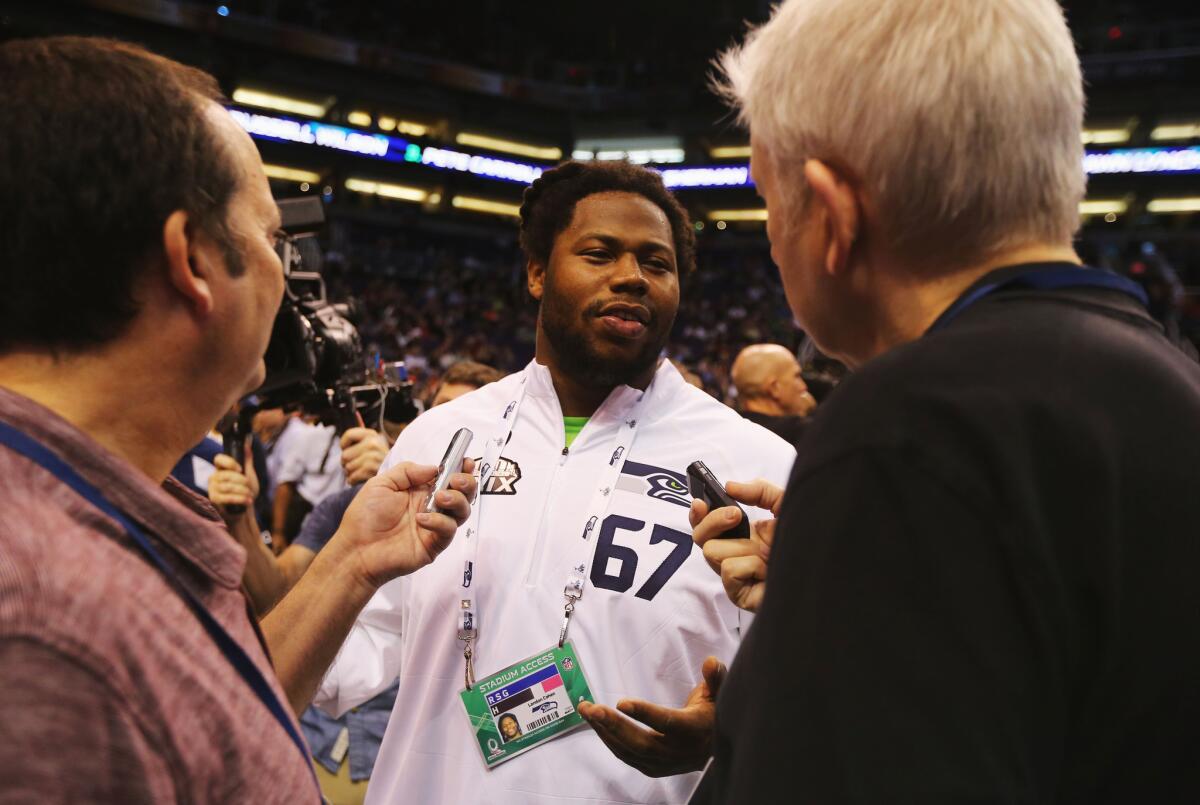Super Bowl job is meaningful for players who have worked outside NFL

- Share via
FROM PHOENIX — Landon Cohen is a Seattle Seahawks defensive tackle who’s getting ready to play in the Super Bowl, so it’s not unusual that he’s been behind the wheel of some beautiful automobiles.
“You name it,” he said, “Ferraris, top-of-the-line Mercedes, Corvettes, all kinds of stuff.”
But this might surprise you: Cohen was only parking those cars for the people who owned them.
That’s right, as recently as last month, he was working for a valet company he and his buddies formed in 2012 in their hometown of Spartanburg, S.C. He only got a call from the Seahawks after defensive tackle Jordan Hill went down with a knee injury in the regular-season finale against St. Louis.
“To be successful in this world, you’ve got to have a work ethic,” said Cohen, a seventh-round pick by Detroit in 2008 who has hit the waiver wire 10 times in seven seasons, making stops in Detroit, Jacksonville, New England (twice), Seattle (twice), Arizona, Philadelphia, Dallas, Chicago and Buffalo. “I started working at 14 at Winn-Dixie, a grocery store — a bagger, a cashier, stocking shelves — and then after college I started to substitute teach.
“I’m no stranger to work.”
And he’s not alone. Many of the players on both Super Bowl XLIX teams have experienced how the other half — or other 99.9% of the workforce — lives.
Seahawks fullback Mike Zimmer worked at a golf course in college, and motored around in one of those caged carts that collects balls on the driving range. His buddies would come out and use him for target practice.
New England left tackle Nate Solder, who protects Tom Brady’s blind side, once had the glamorous job of cleaning up trashed houses after renters had moved out. He had another gig working for a whitewater rafting outfit, standing on a river bank and taking pictures of groups as they splashed past.
In the old days of the NFL, players had workaday jobs in the off-season — selling cars, working construction, driving trucks. But now the money is so spectacular, training is year-round, and athletes are so specialized that it’s becoming less frequent for players to have real-world work experience outside of football.
But those Seahawks and Patriots who know the feeling of earning a paycheck away from the game — even if it was in high school or college — have a special appreciation for the opportunity they now have.
Seahawks punter Jon Ryan, who threw a touchdown pass on a fake field goal in the NFC championship game, moonlighted during his college years as a janitor at a water park in Canada.
“At times like these, you kind of remember where you came from, and how farfetched this dream seemed at points when you’re cleaning toilets in the women’s bathroom of a Regina, Saskatchewan, water park. Feels a long way from the NFL.”
Cooper Helfet, a Seahawks tight end, used to work on a production line shucking oysters. Seattle defensive tackle Brandon Mebane spent summers working with his grandfather, a bricklayer.
“I used to get the cement ready and haul the bricks,” Mebane said. “He never let me lay them.”
At one point, as a senior in high school, Patriots tackle Jordan Devey had three jobs. He delivered pizzas, worked for his grandmother’s catering company, and taught music lessons. Then again, he didn’t play football at the time. He had knee problems because he grew so quickly, had to stop playing football, and instead played tuba in the school band while coaches salivated over him as a prospect.
“It’s different when you’re on the side, playing music for the game instead of being out there,” said the 6-foot-6, 317-pound Devey. “You definitely miss it when you’re just watching.”
He turned down several music scholarships to serve his two-year Mormon mission in Costa Rica. When he returned, he had stopped growing. He enrolled at a junior college and played football, eventually moving on to the University of Memphis. He spent a training camp with the Baltimore Ravens before signing with the Patriots at the start of the 2013 season.
“You can’t say enough about how grateful you are to be in the situation you’re in, especially going into Super Bowl week,” he said. “It’s incredible.”
After the Super Bowl is over, crews will begin the arduous task of cleaning University of Phoenix stadium, going seat by seat to pick up the cups and trash and confetti.
If New England cornerback Duron Harmon is still around, he might look up into the stands and feel a little pang. That was once his job during his football off-season at Rutgers, cleaning up venues after big events.
“It’s not the best feeling in the world,” he said. “You’ve got gum, spilled soda, hot dogs, all that stuff you really don’t want to pick up but you know you have to do it.
“I found $20 once. That was my best day.”
On second thought, maybe not his best one.
Follow Sam Farmer on Twitter @LATimesfarmer
More to Read
Go beyond the scoreboard
Get the latest on L.A.'s teams in the daily Sports Report newsletter.
You may occasionally receive promotional content from the Los Angeles Times.











